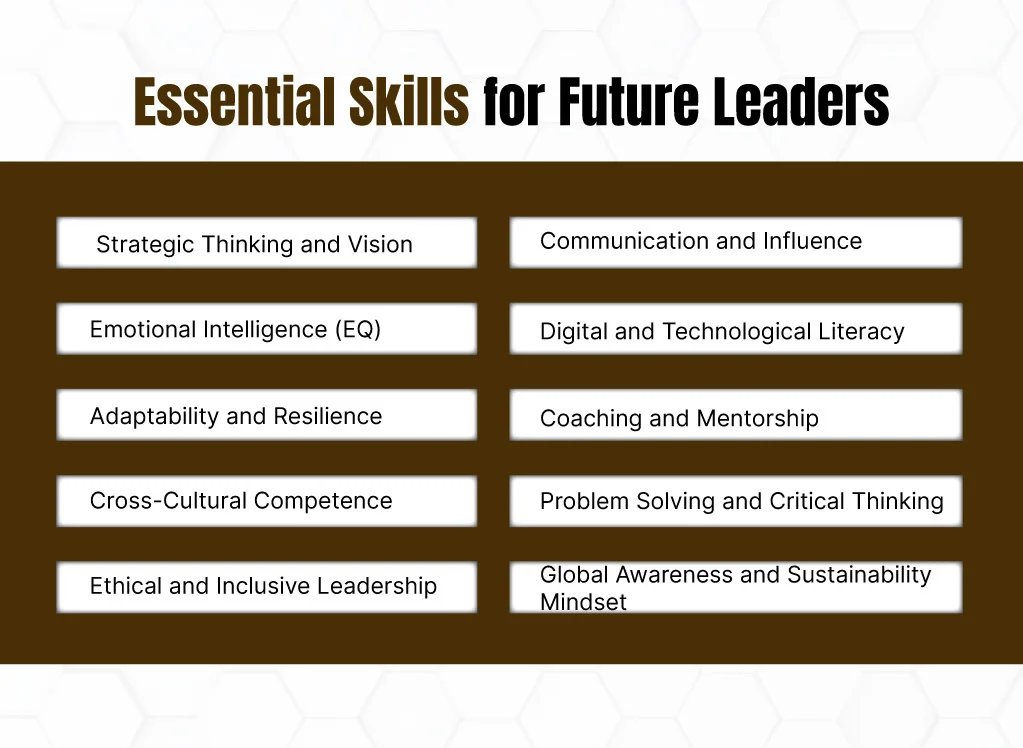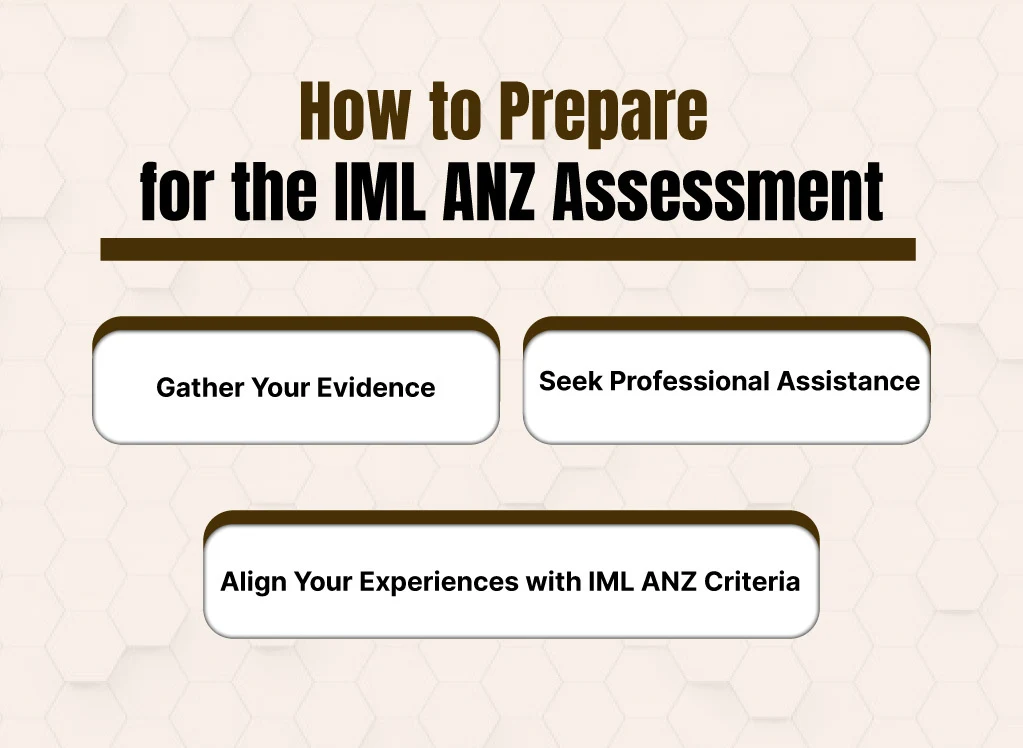Beyond Management: Essential Skills for the Future Leaders

Beyond Management: Essential Skills for the Future Leaders
In today’s rapidly changing business landscape, leadership extends far beyond the boundaries of traditional management. The 21st century demands leaders who can navigate global complexities, inspire innovation, and demonstrate adaptability.
For professionals aspiring to migrate and work in Australia under leadership and management occupations, developing these future-ready skills is not only a career necessity but also a critical step towards a successful IML ANZ Assessment, the leadership assessment for Australia migration.
This blog explores the essential skills that distinguish tomorrow’s leaders from conventional managers, explains the IML ANZ (Institute of Managers and Leaders, Australia and New Zealand) Assessment process, and outlines how cultivating advanced leadership competencies can strengthen your professional and migration prospects in Australia.
What Does It Mean to Go Beyond Management?
The term “management” traditionally refers to planning, organising, directing, and controlling, the functions that ensure business operations run efficiently.
However, “leadership” goes further. Leadership involves influencing, inspiring, and driving change. It is not confined to authority or position but is defined by vision, emotional intelligence, and the ability to motivate teams towards shared goals.
When professionals move beyond management, they shift from simply maintaining systems to creating transformation. They embrace empathy, cultural intelligence, adaptability, and innovation, all essential for navigating the modern workplace.
In the context of the IML ANZ Assessment, these traits are highly valued. The Institute of Managers and Leaders (IML ANZ) assesses applicants’ managerial experience, leadership potential, and strategic influence to determine their eligibility for skilled migration under Australia’s leadership and management categories.
Understanding IML ANZ and Its Importance
What is IML ANZ?
The Institute of Managers and Leaders Australia and New Zealand (IML ANZ) is the recognised authority that assesses management and leadership professionals for Australian skilled migration purposes. If you are applying under leadership-related ANZSCO codes such as Corporate Services Manager (132111), Sales and Marketing Manager (131112), or General Manager (111211), you will likely require an IML ANZ skills assessment.
Why is the IML ANZ Assessment Important?
The IML ANZ Assessment verifies whether an applicant possesses the required professional competencies and practical experience expected from leaders in Australia.
It ensures that candidates meet the Australian Qualifications Framework (AQF) standards and demonstrate leadership capability beyond operational management.
Through the leadership assessment for Australia migration, IML ANZ evaluates your:
- Strategic decision-making abilities
- Team and stakeholder leadership
- Innovation and problem-solving skills
- Commitment to ethical management practices
- Contribution to organisational success
In short, your IML ANZ skills assessment is not merely about verifying qualifications; it’s about showcasing your evolution beyond management into leadership excellence.
The Evolution of Leadership in the Modern Era
From Command to Collaboration
Traditional managers focused on control, while future leaders focus on collaboration. The digital age has flattened hierarchies, encouraging open communication and inclusivity. Leaders are now expected to empower rather than command.
From Stability to Adaptability
Change is constant, from technology disruption to global crises. The leaders of tomorrow must thrive amid uncertainty. Adaptability and resilience are essential skills that IML ANZ recognises during the assessment process.
From Individual Success to Collective Growth
A true leader’s success lies in enabling others to succeed. This mindset is integral to the IML ANZ leadership assessment, where evidence of mentoring, developing, and motivating teams carries significant weight.
Essential Skills for Future Leaders

To qualify as a top-tier leader in both organisational and migration contexts, aspiring professionals must cultivate a holistic skill set that encompasses strategic vision, emotional intelligence, and ethical responsibility. Below are the key skills you should master.
1. Strategic Thinking and Vision
Future leaders must think beyond daily operations. They anticipate future trends, identify opportunities, and align their organisation’s vision with long-term goals.
IML ANZ Assessment Tip:
When preparing your leadership assessment for Australia migration, provide examples of how you’ve developed or implemented strategic plans that influenced organisational growth. Highlight measurable outcomes such as improved profitability, market expansion, or enhanced productivity.
2. Emotional Intelligence (EQ)
Emotional intelligence, the ability to understand and manage one’s own emotions and those of others, is a defining characteristic of great leaders. It improves team morale, communication, and decision-making.
Key Elements:
- Self-awareness
- Empathy
- Social skills
- Motivation
- Self-regulation
IML ANZ Relevance:
Candidates who demonstrate emotional intelligence are viewed as capable of fostering inclusive, supportive, and high-performing work environments, traits highly valued in the IML ANZ leadership competency framework.
3. Adaptability and Resilience
In an era of automation, hybrid work, and global volatility, adaptability is vital. Leaders must quickly learn, unlearn, and relearn.
Examples of adaptable leadership:
- Successfully managing teams during remote transitions
- Pivoting business models in response to market shifts
- Maintaining morale during organisational restructuring
IML ANZ Assessment Tip:
Include instances in your IML ANZ application where you demonstrated flexibility under pressure or led your team through transformation. Evidence of resilience under challenge significantly strengthens your case.
4. Cross-Cultural Competence
As workplaces become increasingly global, cultural intelligence (CQ) is crucial. Future leaders understand, respect, and integrate diverse perspectives.
In the context of Australia’s multicultural environment, cross-cultural communication skills are indispensable. IML ANZ looks for leaders who can collaborate effectively across borders and manage international teams.
5. Ethical and Inclusive Leadership
Ethical leadership means doing the right thing even when it’s difficult. It promotes integrity, accountability, and trust, all core Australian business values.
IML ANZ emphasises ethics in its leadership assessment for Australian migration because ethical leaders maintain the credibility and sustainability of their organisations.
Showcase examples like:
- Implementing ethical procurement practices
- Advocating for gender or diversity inclusion
- Establishing transparent reporting standards
6. Digital and Technological Literacy
Future leaders must embrace digital transformation. Understanding how technology shapes industries enables better decisions and innovation.
Examples include:
- Using data analytics for decision-making
- Leading digital transformation initiatives
- Implementing AI or automation to improve efficiency
IML ANZ Tip:
In your assessment, illustrate your comfort with digital tools or mention leadership in digital projects. These demonstrate future readiness.
7. Communication and Influence
Clear, persuasive communication remains the cornerstone of leadership. It’s about more than words, it’s about inspiring action.
Skills to highlight:
- Negotiation and conflict resolution
- Storytelling for engagement
- Presentations to diverse stakeholders
Strong communication is often cited in IML ANZ assessment criteria as a key differentiator between managers and leaders.
8. Coaching and Mentorship
Leadership is not just about directing but also about developing others. A successful leader identifies potential in their team members and nurtures it.
Examples:
- Mentoring new managers
- Creating learning and development programs
- Encouraging innovation through constructive feedback
In your IML ANZ submission, mention any mentoring or talent development initiatives you’ve led to showcase your long-term leadership vision.
9. Problem Solving and Critical Thinking
Future leaders don’t just react; they diagnose problems, identify root causes, and propose strategic solutions. The IML ANZ emphasises evidence-based decision-making and analytical acumen.
Use real workplace examples where your decisions led to:
- Cost reductions
- Process improvements
- Innovation outcomes
10. Global Awareness and Sustainability Mindset
Sustainability and social responsibility are integral to modern leadership. Future leaders are environmentally conscious, socially responsible, and globally aware.
IML ANZ recognises leaders who promote sustainable practices, corporate responsibility, and community engagement, aligning with Australia’s broader ethical business culture.
The Role of IML ANZ Assessment in Recognising Future Leaders
The IML ANZ Assessment is not merely a procedural requirement for Australian migration; it is an official recognition of your professional competence as a leader. It validates that your management experience aligns with Australian standards of leadership excellence.
Key Components of the IML ANZ Assessment:
1. Qualification Review:
Your academic qualifications are evaluated against the Australian Qualifications Framework (AQF) standards.
2. Work Experience Verification:
IML ANZ assesses your professional history to ensure you have substantial leadership experience (typically at least 3 years in managerial roles).
3. Competency Demonstration:
Applicants must showcase leadership achievements aligned with IML ANZ’s Leadership Competency Framework, such as strategic direction, people management, and innovation.
4. Supporting Documentation:
This includes detailed resumes, organisational charts, reference letters, and job descriptions.
5. Outcome and Recognition:
Successful applicants receive an IML ANZ Skills Assessment Outcome Letter, confirming their eligibility to apply for skilled migration in Australia.
Leadership Occupations Assessed by IML ANZ
IML ANZ assesses a range of leadership and management occupations under ANZSCO. Examples include:
| ANZSCO Code | Occupation Title |
| 111211 | Corporate General Manager |
| 132111 | Corporate Services Manager |
| 131112 | Sales and Marketing Manager |
| 132411 | Policy and Planning Manager |
| 132511 | Research and Development Manager |
These roles require applicants to demonstrate not only operational management capabilities but also strategic influence and ethical leadership, qualities aligned with the “Beyond Management” philosophy.
How to Prepare for the IML ANZ Assessment
1. Gather Your Evidence
Collect detailed documentation of your leadership achievements, including:
- Work experience letters
- Job descriptions
- Project reports
- KPIs and performance outcomes
- Testimonials or references from superiors
2. Align Your Experiences with IML ANZ Criteria
Map your professional experiences to the IML ANZ leadership competencies. Use specific examples demonstrating:
- Strategic contribution
- Staff development
- Ethical management
- Innovation and adaptability
3. Seek Professional Assistance
Many applicants seek expert guidance from migration service providers who specialise in preparing IML ANZ skills assessment applications. These professionals ensure your documents meet the required standards and reflect your leadership competencies accurately.
Why Leadership Skills Matter for Migration to Australia
Australia’s labour market increasingly prioritises leadership, innovation, and ethical management. The government’s skilled migration framework recognises these attributes as essential for driving national productivity and economic growth.
By excelling in your IML ANZ leadership assessment, you:
- Demonstrate eligibility for migration under skilled occupation categories
- Gain recognition as a globally competent leader
- Strengthen your employability in Australia’s dynamic business ecosystem
From Manager to Visionary: The Future Leader’s Journey
The difference between a manager and a future leader lies in mindset.
A manager maintains processes.
A leader envisions possibilities.
As you pursue your IML ANZ assessment, remember, the goal is not just to prove managerial competency but to demonstrate your ability to influence, innovate, and inspire.
Beyond management lies the essence of leadership: empowering others, leading with integrity, and shaping the future.
Conclusion
In a world where industries evolve overnight, leadership is no longer about authority; it’s about agility, empathy, and innovation. The IML ANZ Assessment helps Australia identify and welcome professionals who embody these modern leadership traits.
For those aspiring to migrate to Australia and make a meaningful impact, now is the time to go beyond management. Develop the skills, document your achievements, and showcase your leadership journey through the IML ANZ framework.
Your leadership story could be the key that unlocks both your professional growth and your Australian migration success.
Frequently Asked Questions (FAQ)
1. What is the IML ANZ Skills Assessment?
The IML ANZ Assessment evaluates the qualifications and work experience of management and leadership professionals to ensure they meet Australian standards for skilled migration.
2. Who needs the IML ANZ Assessment?
Professionals applying for skilled visas under management or leadership-related ANZSCO occupations, such as General Manager or Corporate Services Manager, require an IML ANZ Assessment.
3. How do I apply for an IML ANZ Assessment?
You can apply directly through the official IML ANZ website by submitting your qualifications, resume, reference letters, and relevant documentation. Many applicants also seek help from expert migration consultants.
4. What are the key leadership skills IML ANZ looks for?
IML ANZ assesses strategic thinking, communication, ethical leadership, team development, and innovation, the competencies that define future-ready leaders.
5. How long does the IML ANZ Assessment take?
Typically, the process takes 8–10 weeks, depending on the completeness and accuracy of your documentation.
6. How can I improve my chances of a positive assessment?
Align your experience with the IML ANZ competency framework, provide clear evidence of your leadership contributions, and seek professional guidance to ensure your application meets the required standards.
Final Thought
The path to becoming a recognised leader and achieving Australian migration success begins with developing the right skills and presenting them effectively through the IML ANZ leadership assessment.
Leadership is no longer about managing people; it’s about inspiring change. Go beyond management. Become the leader of tomorrow.

 Chat with us
Chat with us